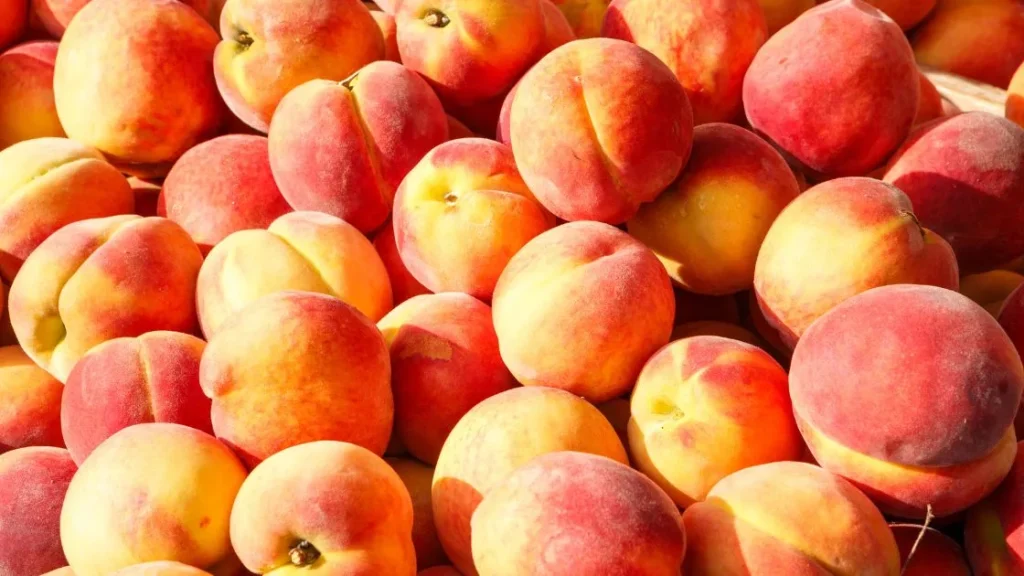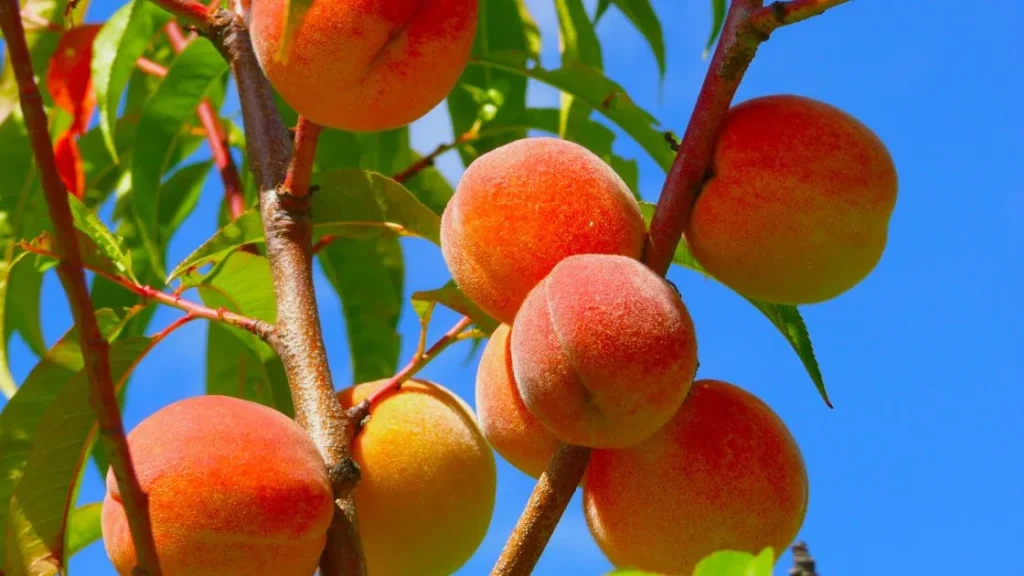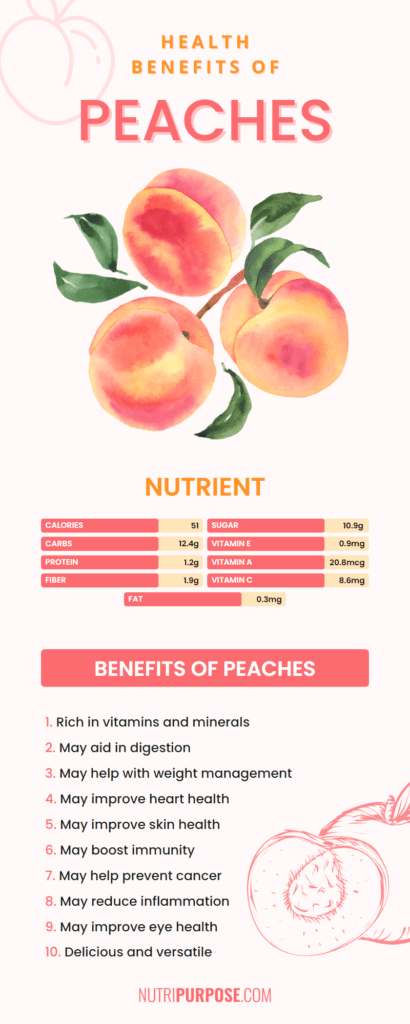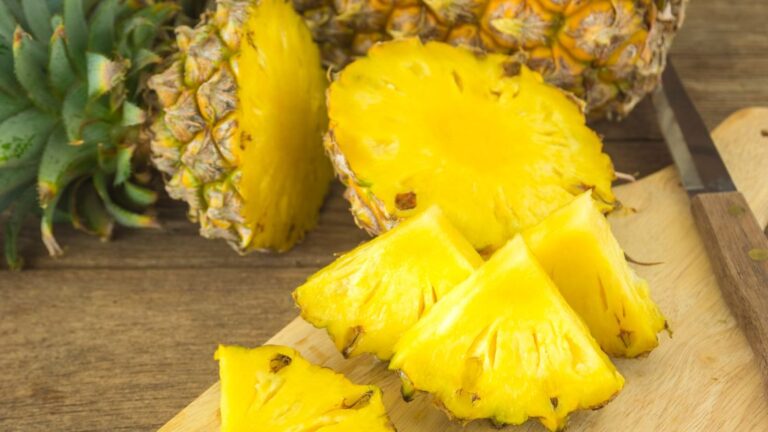- They are a great source of vitamins, minerals, and antioxidants contributing to overall health
- The antioxidants in peaches help protect against chronic diseases
- They support digestive health and hydration
- The vitamins in peaches promote healthy skin
- They can be enjoyed in a variety of delicious recipes
If you’re following an alkaline diet, you might wonder how to include more fruit.
One issue you can run into is that most fruits are more acidic than an alkaline diet allows.
One option for you to consider is fresh peaches – a great fiber source and antioxidants.
In this blog post, we’ll discuss the health benefits of peaches on an alkaline diet.
We’ll also explain how they can help improve your overall health.
We’ll provide tips on preparing and including peaches in recipes.
So, read on and learn more about their historical uses and production, health benefits, recipes, and why they work in an alkaline diet.
If you’re looking for a healthy addition to your diet, try peaches on an alkaline diet!
Physical Description
Peaches are typically yellow or orange and have a soft texture with a sweet, juicy, and aromatic flavor.
Peaches are often found in the summertime and are commonly used in dessert recipes.

The skin of a peach can range from yellow to a deep golden color.
The skin varies between smooth and fuzzy, depending on the variety, and they bruise easily.
The fleshy part of the fruit is more delicate in texture with a velvety taste.
Peaches can have different levels of sweetness, from very sweet to slightly tart.
History and Production
Peaches are popular in many parts of the world, including North America, Europe, and Asia.
It has been used in a variety of ways throughout history for health and culinary reasons.
In North America, canned peaches are mainstream and often used to make preserves, jellies, and other food products.
In Europe, peaches are often served fresh or used in dishes like fruit salads.
t has been used in traditional medicine for centuries, and today, it is still used to treat a variety of ailments.
Some of the most common uses for peaches include treatment for diabetes, high cholesterol, and heart disease.
One of the most widely historical uses of peaches was as a source of fuel for cooking.
Peaches provide lots of natural sugars that can be converted into energy by boiling or roasting.
The juice can be distilled to create various types of alcoholic beverages, such as brandy and peach schnapps.
In addition to their culinary uses, peaches are also grown commercially.

What is the Ph Scale?
The pH scale is a measure of the concentration of hydrogen ions (pH) in a solution.
It ranges from 0 to 14, with 7 as the neutral point.
The lower the number on the pH scale, the more acidic the solution is.
On the other hand, a higher pH value indicates a more fundamental solution.
The pH of fruit is typically around 4.5 to 5.5, which is just right for proper ripening and flavor retention.
Any fruit with a pH level over 4.6 is considered acidic but could still be alkaline-forming.
With a Ph of 4.05, peaches are considered acidic.
You should consume them in moderation or consult with your doctor if a healthcare professional suggests an alkaline diet.
It is well-known that an alkaline diet can help promote better health and wellness.
One of the main reasons is that foods with high moisture content, such as fruits and vegetables, characterize an alkaline diet.
This helps provide you with essential nutrients and vitamins while maintaining a balanced pH level.
Nutrition Facts About Peaches

Peach trees fruit in summer and prefer to grow in warmer temperatures.
They are chock-full of vitamins, minerals, and antioxidants.
Peaches are also naturally cholesterol, fat, and sodium-free.
But remember, peaches are semi-acidic, so moderation is key!
Below is information on all the healthy vitamins and minerals found in one single (small) peach (about 130g).
- Vitamin E – 0.9mg
- Vitamin A – 20.8mcg
- Vitamin C – 8.6mg
- Fiber – 1.9g
- Calories – 51
- Fat – 0.3mg
- Carbohydrates – 12.4g
- Sugars – 10.9g
- Protein – 1.2g
Health Benefits of Peaches

Although they are more acidic, peaches (or nectarines, for that matter) can still benefit you.
One of the primary nutrients is Vitamin C, which helps support your heart health, immune function, tissue repair, and cellular growth.
Rich in Nutrients
Peaches are packed with essential vitamins and minerals that contribute to overall health.
They are a great source of vitamin C, vitamin A, potassium, and fiber.
Vitamin C helps boost the immune system, while vitamin A supports healthy vision and skin.
Potassium is vital for maintaining healthy blood pressure levels, and fiber aids in digestion and promotes satiety.
Antioxidant Powerhouse
Peaches are high in antioxidants that help protect the body against harmful free radicals.
These antioxidants, such as chlorogenic acid and flavonoids, have been linked to reducing the risk of chronic diseases, including heart disease and certain types of cancer.
Consuming peaches regularly can contribute to a healthier and more resilient body.
Supports Digestive Health
Peaches contain natural dietary fiber source, which is crucial in promoting healthy digestion.
Fiber adds bulk to the stool, aiding in regular bowel movements and preventing constipation.
It also supports gut health by acting as a prebiotic, promoting the growth of beneficial bacteria in the digestive system.
Hydration and Weight Management
Peaches may have a high water content, making them an excellent hydrating fruit.
Staying adequately hydrated is essential for maintaining optimal bodily functions, including regulating body temperature and supporting cardiovascular health.
The water content of peaches, combined with their fiber content, can also contribute to feeling full and satisfied, aiding in weight management and preventing overeating.
Skin Health
The vitamins and antioxidants found in peaches play a significant role in maintaining healthy skin.
Vitamin C stimulates collagen production, which promotes skin elasticity and reduces the appearance of wrinkles.
Additionally, the antioxidants in peaches help protect the skin from damage caused by environmental factors such as UV rays and pollution.
Regularly eating peaches also contributes to a radiant and youthful complexion.
Overall, peaches are a delicious and nutritious fruit that offers a range of health benefits. Whether enjoyed fresh, grilled, or incorporated into various dishes, peaches are a delightful addition to a balanced diet.
List Benefits
Eating fruits like peaches on an alkaline diet can provide you with many health benefits.
These include the following;
- Drastically improve your skin and hair quality and increase energy levels.
- High in fiber – this helps to promote regularity and help improve your digestion and maintain cholesterol levels.
- Rich in essential vitamins and minerals, including vitamin C and potassium.
- Provide additional antioxidants and nutrients to support your body’s immune system and fight against diseases.
Peaches Recipes
Peach Panzanella
A classic Italian dish made with fresh garden vegetables, crusty bread, and a tangy garlic sauce.
Panzanella is a combination of the words “pan” (meaning “bread”) and “zanella” (a type of salad).
This recipe uses ripe, fresh peaches to create a sweet and savory combination that is perfect for summertime gatherings!
Ingredients
- 1 1/2 cups breadcrumbs
- 3 tablespoons olive oil
- 1 pint ripe peaches (peeled and thinly sliced)
- 4 cloves garlic, minced.
- Salt and pepper to taste
- 1/4 cup white wine vinegar
- 3 tablespoons sugar substitute (such as Splenda) or honey
- 2-6 fresh basil leaves, chopped
Directions
- . Preheat the oven to 250 degrees Fahrenheit.
- In a shallow dish, combine 1 cup of breadcrumbs with 3 tablespoons of olive oil until the ingredients are evenly combined.
- Place the peach slices in another shallow dish and pour over the breadcrumb mixture, coating each slice evenly. Massage gently so everything is coated well (the coating will be sticky).
- Transfer the sliced peach slices onto a baking sheet fitted with parchment paper or silicone baking mats and bake for 20-25 minutes or until golden
Peach and Almond Slices
Peach and almond slices are a delicious combination of sweet, juicy fruit and nutty, chewy goodness.
These two flavors come together in the form of a delightful dessert that is perfect for summertime.
Ingredients
- 1 peach, sliced
- 1/2 cup slivered almonds
- whipped cream or ice cream for serving
Directions
- Preheat oven to 375 degrees F (190 degrees C).
- Arrange peach slices on a baking sheet. Sprinkle with almonds and bake for 10-15 minutes, until lightly browned and at the desired doneness. Serve warm, topped with whipped cream or ice cream if desired!
Feeling Peachy?
With so many surprising health benefits and uses of peaches, nothing is stopping you from including them in your alkaline diet.
Just make sure to indulge in moderation!
They make for a sweet yet healthy dessert alternative,









